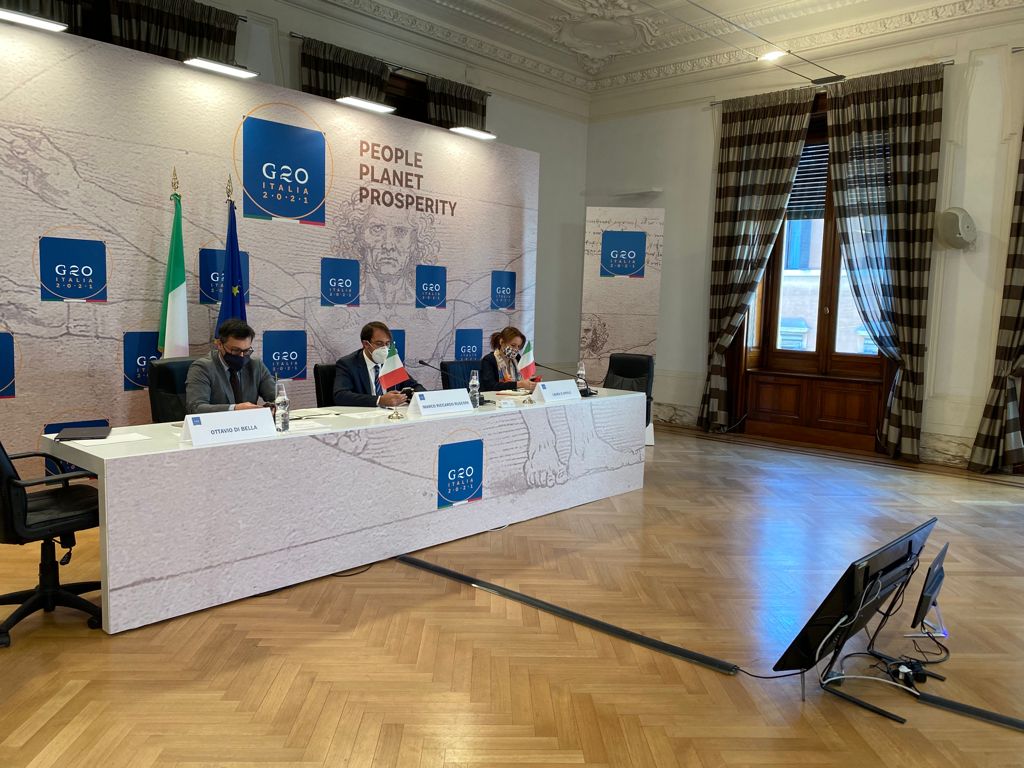First G20 Environment Deputies Meeting (EDM)
In line with the three pillars People, Planet and Prosperity, the Italian G20 Presidency has planned five meetings dedicated to environmental issues, to prepare the ground for the G20 Environment Ministers' Meeting which will take place on 22 July 2021, conducted in synergy with the Ministerial Meeting on Climate Change and Energy, on 23 July 2021.
March 26th, 2021
In line with the three pillars People, Planet and Prosperity, the Italian G20 Presidency has planned five meetings dedicated to environmental issues, to prepare the ground for the G20 Environment Ministers’ Meeting which will take place on 22 July 2021, conducted in synergy with the Ministerial Meeting on Climate Change and Energy, on 23 July 2021.
The first preparatory meeting was held virtually on 24 March 2021 and gathered delegates from the G20 Member States, guest countries, and representatives from the UNCCD, UNEP, UNESCO, FAO, UNDP, OECD, IFAD and UNIDO. It was also attended by relevant organizations such as IUCN and WWF, on behalf of the platform of Civil Society Organizations (C20).
Preceded by several preparatory meetings, the session focused on the key outcomes the G20 aims to achieve and on the themes addressed in the previous Environment Ministers’ Meeting, namely: biodiversity, nature conservation, ecosystem and land restoration, and sustainable water use.
Chaired by the Italian Ministry for Ecological Transition, with the contribution of the Italian Institute for Environmental Protection and Research (ISPRA), the meeting was characterized by an open and constructive discussion among Member States, enriched by a number of contributors including representatives from the UNCCD Secretariat who presented the Land Degradation Neutrality approach linked to ecosystem restoration, the UNESCO Natural Sciences Sector and its World Water Assessment Program (WWAP) based in Perugia, Italy. UNESCO also introduced its International Environmental Experts Network”, an initiative launched in December 2020 with the support of Italy, which is open to other donor countries. The Fund aims to improve the technical support and training of experts for the restoration and conservation of UNESCO designated natural territories and protected areas, such as World Heritage Sites, Geoparks and Biosphere Reserves.
The G20 delegates discussed initiatives regarding the proposed integrated approach aiming to synergistically tackle biodiversity loss and climate change mitigation and adaptation challenges through nature-based solutions (NbS), supported by reliable scientific studies; also with a view to making headway towards the conservation targets for the next decade of the Post-2020 Global Biodiversity Framework of the Convention on Biological Diversity taking place in October. Participants acknowledged the interdependencies between biodiversity loss and climate change, as well as the interlinkages between the emergence of pandemics and global environmental changes such as land-use, agricultural expansion and intensification, trade and consumption of wildlife, and intensive livestock farming. Participants discussed the proposal of a communiqué on NbS that would specifically address combating illegal wildlife trade and illegal logging, enhancing marine protected areas and their communities, tackling food loss and waste, green finance and other issues to be addressed and examined in the next sessions.
In line with the launch of the United Nations Decade on Ecosystem Restoration in 2021, delegates expressed their general support towards achieving the target of “Land Degradation Neutrality”, with a view to obtaining social and economic benefits and improving ecological sustainability by 2030.
Many G20 delegates expressed their appreciation for a specific session dedicated to Sustainable Water Use within the Environment context and called for continuing the Dialogue on Water, an initiative started in 2020 by Saudi Arabia. Considerable attention was given to the protection and sustainable use of water resources, essential for healthy ecosystems and socio-economic development. Particular focus was placed on improving water resources management, making it adaptive, sustainable and inclusive – also from a cross-border and regional perspective – to protect ecosystem functions, to ensure sustainable development, and to achieve universal and equitable access to safe drinking water and sanitation.
